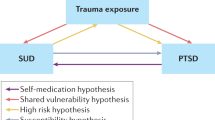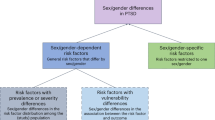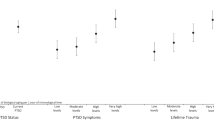Abstract
Although earlier trauma exposure is known to predict posttraumatic stress disorder (PTSD) after subsequent traumas, it is unclear whether this association is limited to cases where the earlier trauma led to PTSD. Resolution of this uncertainty has important implications for research on pretrauma vulnerability to PTSD. We examined this issue in the World Health Organization (WHO) World Mental Health (WMH) Surveys with 34 676 respondents who reported lifetime trauma exposure. One lifetime trauma was selected randomly for each respondent. DSM-IV (Diagnostic and Statistical Manual of Mental Disorders, 4th Edition) PTSD due to that trauma was assessed. We reported in a previous paper that four earlier traumas involving interpersonal violence significantly predicted PTSD after subsequent random traumas (odds ratio (OR)=1.3–2.5). We also assessed 14 lifetime DSM-IV mood, anxiety, disruptive behavior and substance disorders before random traumas. We show in the current report that only prior anxiety disorders significantly predicted PTSD in a multivariate model (OR=1.5–4.3) and that these disorders interacted significantly with three of the earlier traumas (witnessing atrocities, physical violence victimization and rape). History of witnessing atrocities significantly predicted PTSD after subsequent random traumas only among respondents with prior PTSD (OR=5.6). Histories of physical violence victimization (OR=1.5) and rape after age 17 years (OR=17.6) significantly predicted only among respondents with no history of prior anxiety disorders. Although only preliminary due to reliance on retrospective reports, these results suggest that history of anxiety disorders and history of a limited number of earlier traumas might usefully be targeted in future prospective studies as distinct foci of research on individual differences in vulnerability to PTSD after subsequent traumas.
This is a preview of subscription content, access via your institution
Access options
Subscribe to this journal
Receive 12 print issues and online access
$259.00 per year
only $21.58 per issue
Buy this article
- Purchase on Springer Link
- Instant access to full article PDF
Prices may be subject to local taxes which are calculated during checkout
Similar content being viewed by others
References
Atwoli L, Stein DJ, Koenen KC, McLaughlin KA. Epidemiology of posttraumatic stress disorder: prevalence, correlates and consequences. Curr Opin Psychiatry 2015; 28: 307–311.
Benjet C, Bromet E, Karam EG, Kessler RC, McLaughlin KA, Ruscio AM et al. The epidemiology of traumatic event exposure worldwide: results from the World Mental Health Survey Consortium. Psychol Med 2016; 46: 327–343.
Bomyea J, Risbrough V, Lang AJ. A consideration of select pre-trauma factors as key vulnerabilities in PTSD. Clin Psychol Rev 2012; 32: 630–641.
Liberzon I, Abelson JL. Context processing and the neurobiology of post-traumatic stress disorder. Neuron 2016; 92: 14–30.
Smoller JW. The genetics of stress-related disorders: PTSD, depression, and anxiety disorders. Neuropsychopharmacology 2016; 41: 297–319.
Horn SR, Charney DS, Feder A. Understanding resilience: new approaches for preventing and treating PTSD. Exp Neurol 2016; 284(Pt B): 119–132.
Kessler RC, Rose S, Koenen KC, Karam EG, Stang PE, Stein DJ et al. How well can post-traumatic stress disorder be predicted from pre-trauma risk factors? An exploratory study in the WHO World Mental Health Surveys. World Psychiatry 2014; 13: 265–274.
DiGangi JA, Gomez D, Mendoza L, Jason LA, Keys CB, Koenen KC. Pretrauma risk factors for posttraumatic stress disorder: a systematic review of the literature. Clin Psychol Rev 2013; 33: 728–744.
Kessler RC, McLaughlin KA, Green JG, Gruber MJ, Sampson NA, Zaslavsky AM et al. Childhood adversities and adult psychopathology in the WHO World Mental Health Surveys. Br J Psychiatry 2010; 197: 378–385.
Nemeroff CB. Paradise lost: the neurobiological and clinical consequences of child abuse and neglect. Neuron 2016; 89: 892–909.
Green JG, McLaughlin KA, Berglund PA, Gruber MJ, Sampson NA, Zaslavsky AM et al. Childhood adversities and adult psychiatric disorders in the national comorbidity survey replication I: associations with first onset of DSM-IV disorders. Arch Gen Psychiatry 2010; 67: 113–123.
McLaughlin KA, Greif Green J, Gruber MJ, Sampson NA, Zaslavsky AM, Kessler RC. Childhood adversities and first onset of psychiatric disorders in a national sample of US adolescents. Arch Gen Psychiatry 2012; 69: 1151–1160.
Breslau N, Peterson EL. Assaultive violence and the risk of posttraumatic stress disorder following a subsequent trauma. Behav Res Ther 2010; 48: 1063–1066.
Breslau N, Peterson EL, Schultz LR. A second look at prior trauma and the posttraumatic stress disorder effects of subsequent trauma: a prospective epidemiological study. Arch Gen Psychiatry 2008; 65: 431–437.
Cougle JR, Resnick H, Kilpatrick DG. Does prior exposure to interpersonal violence increase risk of PTSD following subsequent exposure? Behav Res Ther 2009; 47: 1012–1017.
Harkness KL, Hayden EP, Lopez-Duran NL. Stress sensitivity and stress sensitization in psychopathology: an introduction to the special section. J Abnorm Psychol 2015; 124: 1–3.
Liu H, Petukhova MV, Sampson NA, Aguilar-Gaxiola S, Alonso J, Andrade LH et al. Association of DSM-IV posttraumatic stress disorder with traumatic experience type and history in the World Health Organization World Mental Health Surveys. JAMA Psychiatry 2017; 74: 270–281.
World Bank. World Bank list of economies (July 2009). (2009). The World Bank; Washington, DC. Available at http://www.iqla.org/joining/World-Bank_Classification-List_2009.pdf Accessed 01 June 2017.
Pennell B-E, Mneimneh ZN, Bowers A, Chardoul S, Wells JE, Viana MC et alImplementation of the World Mental Health Surveys. In: Kessler RC, Üstün TB (eds). The WHO World Mental Health Surveys: Global Perspectives on the Epidemiology of Mental Disorders. Cambridge University Press: New York, NY, 2008, pp 33–57.
Heeringa SG, Wells JE, Hubbard F, Mneimneh ZN, Chiu WT, Sampson NA et alSample designs and sampling procedures. In: Kessler RC, Üstün TB (eds). The WHO World Mental Health Surveys: Global Perspectives on the Epidemiology of Mental Disorders. Cambridge University Press: New York, NY, 2008, pp 14–32.
Kessler RC, Ustun TB. The World Mental Health (WMH) Survey Initiative Version of the World Health Organization (WHO) Composite International Diagnostic Interview (CIDI). Int J Methods Psychiatr Res 2004; 13: 93–121.
Kessler RC, Akiskal HS, Angst J, Guyer M, Hirschfeld RM, Merikangas KR et al. Validity of the assessment of bipolar spectrum disorders in the WHO CIDI 3.0. J Affect Disord 2006; 96: 259–269.
Knäuper B, Cannell CF, Schwarz N, Bruce ML, Kessler RC. Improving accuracy of major depression age‐of‐onset reports in the US National Comorbidity Survey. Int J Methods Psychiatr Res 1999; 8: 39–48.
Haro JM, Arbabzadeh-Bouchez S, Brugha TS, de Girolamo G, Guyer ME, Jin R et al. Concordance of the Composite International Diagnostic Interview Version 3.0 (CIDI 3.0) with standardized clinical assessments in the WHO World Mental Health surveys. Int J Methods Psychiatr Res 2006; 15: 167–180.
First MB, Spitzer RL, Gibbon M, Williams BJ. Structured Clinical Interview for Axis I DSM-IV Disorders. New York State Psychiatric Institute Biometrics Research Department: New York, 1994.
Wolter KM. Introduction to Variance Estimation. Springer-Verlag: New York, 1985.
SAS InstituteSAS Software, Version 9.2 [computer program]. SAS Institute: Cary, NC, 2008.
Scott KM, Koenen KC, King A, Petukhova MV, Alonso J, Bromet EJ et al. Post-traumatic stress disorder associated with sexual assault among women in the WHO World Mental Health Surveys. Psychol Med 2017; e-pub ahead of print 19 June 2017.
Ozer EJ, Best SR, Lipsey TL, Weiss DS. Predictors of posttraumatic stress disorder and symptoms in adults: a meta-analysis. Psychol Bull 2003; 129: 52–73.
Sayed S, Iacoviello BM, Charney DS. Risk factors for the development of psychopathology following trauma. Curr Psychiatry Rep 2015; 17: 70.
Ogle CM, Siegler IC, Beckham JC, Rubin DC. Neuroticism increases PTSD symptom severity by amplifying the emotionality, rehearsal, and centrality of trauma memories. J Pers 2016; e-pub ahead of print 12 August 2016.
The World Health Organization World Mental Health (WMH) Survey Initiative is supported by the National Institute of Mental Health (NIMH; R01 MH070884 and R01 MH093612-01), the John D. and Catherine T. MacArthur Foundation, the Pfizer Foundation, the US Public Health Service (R13-MH066849, R01-MH069864 and R01 DA016558), the Fogarty International Center (FIRCA R03-TW006481), the Pan American Health Organization, Eli Lilly and Company, Ortho-McNeil Pharmaceutical, GlaxoSmithKline and Bristol-Myers Squibb. We thank the staff of the WMH Data Collection and Data Analysis Coordination Centres for assistance with instrumentation, fieldwork and consultation on data analysis. None of the funders had any role in the design, analysis, interpretation of results or preparation of this paper.
A complete list of all within-country and cross-national WMH publications can be found at http://www.hcp.med.harvard.edu/wmh/. The São Paulo Megacity Mental Health Survey is supported by the State of São Paulo Research Foundation (FAPESP) Thematic Project Grant 03/00204-3. The Bulgarian Epidemiological Study of common mental disorders EPIBUL is supported by the Ministry of Health and the National Center for Public Health Protection. The Colombian National Study of Mental Health (NSMH) is supported by the Ministry of Social Protection. The Mental Health Study Medellín–Colombia was carried out and supported jointly by the Center for Excellence on Research in Mental Health (CES University) and the Secretary of Health of Medellín. The ESEMeD project is funded by the European Commission (Contracts QLG5-1999-01042; SANCO 2004123, and EAHC 20081308), (the Piedmont Region (Italy)), Fondo de Investigación Sanitaria, Instituto de Salud Carlos III, Spain (FIS 00/0028), Ministerio de Ciencia y Tecnología, Spain (SAF 2000-158-CE), Departament de Salut, Generalitat de Catalunya, Spain, Instituto de Salud Carlos III (CIBER CB06/02/0046, RETICS RD06/0011 REM-TAP) and other local agencies and by an unrestricted educational grant from GlaxoSmithKline. The Israel National Health Survey is funded by the Ministry of Health with support from the Israel National Institute for Health Policy and Health Services Research and the National Insurance Institute of Israel. The World Mental Health Japan (WMHJ) Survey is supported by the Grant for Research on Psychiatric and Neurological Diseases and Mental Health (H13-SHOGAI-023, H14-TOKUBETSU-026, H16-KOKORO-013) from the Japan Ministry of Health, Labour and Welfare. The Lebanese Evaluation of the Burden of Ailments and Needs Of the Nation (L.E.B.A.N.O.N.) is supported by the Lebanese Ministry of Public Health, the WHO (Lebanon), National Institute of Health/Fogarty International Center (R03 TW006481-01), anonymous private donations to IDRAAC, Lebanon, and unrestricted grants from Algorithm, AstraZeneca, Benta, Bella Pharma, Eli Lilly, Glaxo Smith Kline, Lundbeck, Novartis, Servier, OmniPharma, Phenicia, Pfizer and UPO. The Mexican National Comorbidity Survey (MNCS) is supported by The National Institute of Psychiatry Ramon de la Fuente (INPRFMDIES 4280) and by the National Council on Science and Technology (CONACyT-G30544- H), with supplemental support from the PanAmerican Health Organization (PAHO). Te Rau Hinengaro: The New Zealand Mental Health Survey (NZMHS) is supported by the New Zealand Ministry of Health, Alcohol Advisory Council, and the Health Research Council. The Northern Ireland Study of Mental Health was funded by the Health & Social Care Research & Development Division of the Public Health Agency. The Peruvian World Mental Health Study was funded by the National Institute of Health of the Ministry of Health of Peru. The Romania WMH study projects ‘Policies in Mental Health Area’ and ‘National Study regarding Mental Health and Services Use’ were carried out by National School of Public Health & Health Services Management (former National Institute for Research & Development in Health), with technical support of Metro Media Transilvania, the National Institute of Statistics-National Centre for Training in Statistics, SC Cheyenne Services SRL, Statistics Netherlands and were funded by Ministry of Public Health (former Ministry of Health) with supplemental support of Eli Lilly Romania SRL. The South Africa Stress and Health Study (SASH) is supported by the US National Institute of Mental Health (R01-MH059575) and National Institute of Drug Abuse with supplemental funding from the South African Department of Health and the University of Michigan. The Psychiatric Enquiry to General Population in Southeast Spain–Murcia (PEGASUS-Murcia) Project has been financed by the Regional Health Authorities of Murcia (Servicio Murciano de Salud and Consejería de Sanidad y Política Social) and Fundación para la Formación e Investigación Sanitarias (FFIS) of Murcia. The Ukraine Comorbid Mental Disorders during Periods of Social Disruption (CMDPSD) study is funded by the US National Institute of Mental Health (RO1-MH61905). The US National Comorbidity Survey Replication (NCS-R) is supported by the National Institute of Mental Health (NIMH; U01-MH60220) with supplemental support from the National Institute of Drug Abuse (NIDA), the Substance Abuse and Mental Health Services Administration (SAMHSA), the Robert Wood Johnson Foundation (RWJF; Grant 044708) and the John W. Alden Trust. DJS is supported by the Medical Research Council of South Africa (MRC). The work of HL was supported in part by a training grant from the National Institute of Mental Health (T32 MH017119).
The WHO World Mental Health Survey collaborators
Sergio Aguilar-Gaxiola, Ali Al-Hamzawi, Mohammed Salih Al-Kaisy, Jordi Alonso, Laura Helena Andrade, Corina Benjet, Guilherme Borges, Evelyn J Bromet, Ronny Bruffaerts, Brendan Bunting, Jose Miguel Caldas de Almeida, Graça Cardoso, Somnath Chatterji, Alfredo H Cia, Louisa Degenhardt, Koen Demyttenaere, John Fayyad, Silvia Florescu, Giovanni de Girolamo, Oye Gureje, Josep Maria Haro, Yanling He, Hristo Hinkov, Chi-yi Hu, Yueqin Huang, Peter de Jonge, Aimee Nasser Karam, Elie G Karam, Norito Kawakami, Ronald C Kessler, Andrzej Kiejna, Viviane Kovess-Masfety, Sing Lee, Jean-Pierre Lepine, Daphna Levinson, John McGrath, Maria Elena Medina-Mora, Jacek Moskalewicz, Fernando Navarro-Mateu, Beth-Ellen Pennell, Marina Piazza, Jose Posada-Villa, Kate M Scott, Tim Slade, Juan Carlos Stagnaro, Dan J Stein, Margreet ten Have, Yolanda Torres, Maria Carmen Viana, Harvey Whiteford, David R Williams, Bogdan Wojtyniak.
Disclaimer
The views and opinions expressed in this paper are those of the authors and do not necessarily represent the views or policies of the World Health Organization, other sponsoring organizations, agencies or governments.
Author information
Authors and Affiliations
Consortia
Corresponding author
Ethics declarations
Conflict of Interest
In the past 3 years, RCK received support for his epidemiological studies from Sanofi Aventis; was a consultant for Johnson & Johnson Wellness and Prevention, Shire, Takeda; and served on an advisory board for the Johnson & Johnson Services Lake Nona Life Project. RCK is a co-owner of DataStat, a market research firm that carries out healthcare research. In the past 3 years, DJS has received research grants and/or consultancy honoraria from Biocodex, Lundbeck, Servier and Sun. The other authors declare no conflict of interest.
Rights and permissions
About this article
Cite this article
Kessler, R.C., Aguilar-Gaxiola, S., Alonso, J. et al. The associations of earlier trauma exposures and history of mental disorders with PTSD after subsequent traumas. Mol Psychiatry 23, 1892–1899 (2018). https://doi.org/10.1038/mp.2017.194
Received:
Revised:
Accepted:
Published:
Issue Date:
DOI: https://doi.org/10.1038/mp.2017.194
This article is cited by
-
Predictors of traumatic experiences among individuals experiencing pandemic-related stressors: a cross-sectional study in Europe during the COVID-19 crisis
Current Psychology (2023)
-
Circulating endocannabinoids and genetic polymorphisms as predictors of posttraumatic stress disorder symptom severity: heterogeneity in a community-based cohort
Translational Psychiatry (2022)
-
The impact of quarantine on mental health status among general population in China during the COVID-19 pandemic
Molecular Psychiatry (2021)
-
Socio-demographic and trauma-related predictors of PTSD within 8 weeks of a motor vehicle collision in the AURORA study
Molecular Psychiatry (2021)
-
A global collaboration to study intimate partner violence-related head trauma: The ENIGMA consortium IPV working group
Brain Imaging and Behavior (2021)



